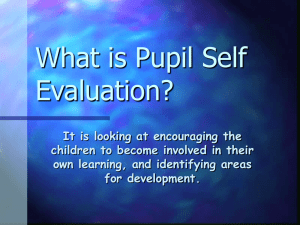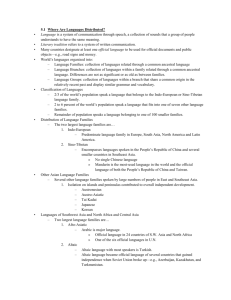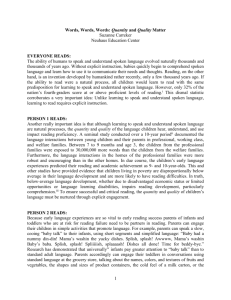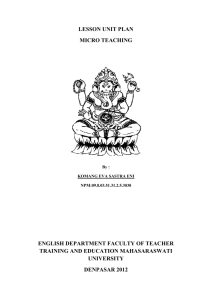The Power of Our Words Homework
advertisement
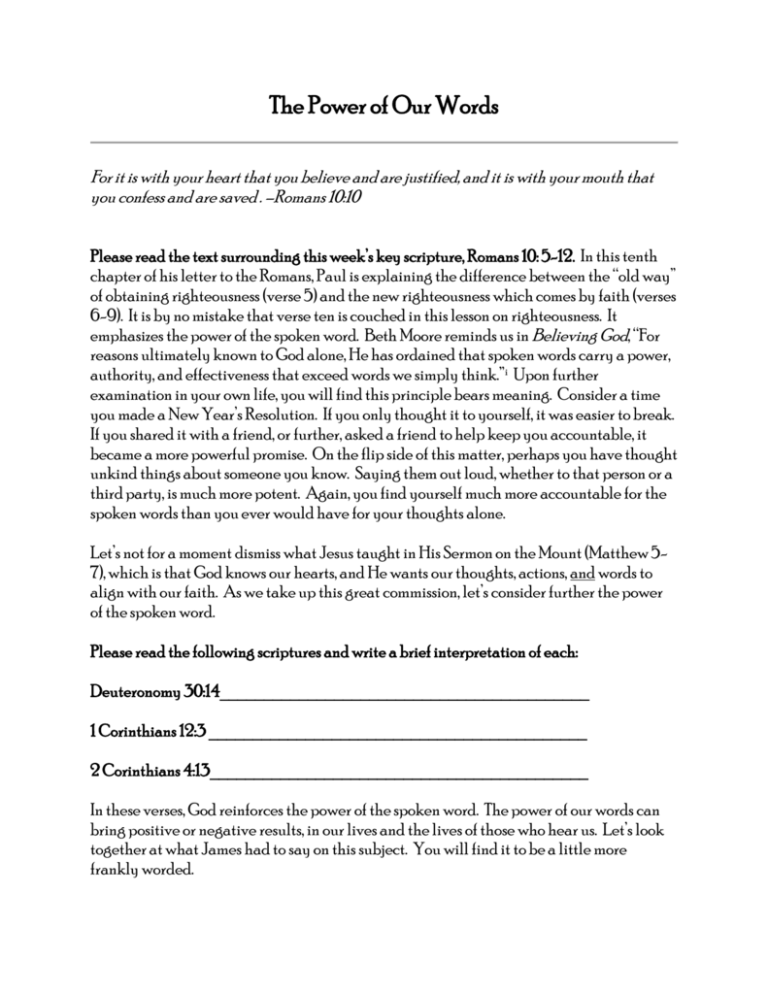
The Power of Our Words For it is with your heart that you believe and are justified, and it is with your mouth that you confess and are saved . –Romans 10:10 Please read the text surrounding this week’s key scripture, Romans 10: 5-12. In this tenth chapter of his letter to the Romans, Paul is explaining the difference between the “old way” of obtaining righteousness (verse 5) and the new righteousness which comes by faith (verses 6-9). It is by no mistake that verse ten is couched in this lesson on righteousness. It emphasizes the power of the spoken word. Beth Moore reminds us in Believing God, “For reasons ultimately known to God alone, He has ordained that spoken words carry a power, authority, and effectiveness that exceed words we simply think.”i Upon further examination in your own life, you will find this principle bears meaning. Consider a time you made a New Year’s Resolution. If you only thought it to yourself, it was easier to break. If you shared it with a friend, or further, asked a friend to help keep you accountable, it became a more powerful promise. On the flip side of this matter, perhaps you have thought unkind things about someone you know. Saying them out loud, whether to that person or a third party, is much more potent. Again, you find yourself much more accountable for the spoken words than you ever would have for your thoughts alone. Let’s not for a moment dismiss what Jesus taught in His Sermon on the Mount (Matthew 57), which is that God knows our hearts, and He wants our thoughts, actions, and words to align with our faith. As we take up this great commission, let’s consider further the power of the spoken word. Please read the following scriptures and write a brief interpretation of each: Deuteronomy 30:14__________________________________________ 1 Corinthians 12:3 ___________________________________________ 2 Corinthians 4:13___________________________________________ In these verses, God reinforces the power of the spoken word. The power of our words can bring positive or negative results, in our lives and the lives of those who hear us. Let’s look together at what James had to say on this subject. You will find it to be a little more frankly worded. Please read James 3:1-12 and write verse 6: _________________________________________________________ _________________________________________________________ When I was young, my mother used to admonish me about my “sharp tongue.” I can’t count how many fistfights I got myself into (and mostly lost) because of my big mouth. Later in my life, having still not learned the lesson, I would say what came to mind rather quickly without “filtering” what might be interpreted by my words. I was lucky enough to have a few friends and a patient husband who helped me to see the negative power of my words. Just the other day a dear friend praised my ability to speak the truth without fear of the consequences, but I reminded her that a bold tongue has two sides. In fact, I asked her to pray for my ongoing struggle with taming the negative side of mine. I often find myself referring back to the above mentioned portion of James. What exactly does he mean to communicate in this passage? The key is found in verses 9-10. Please write those verses here: _________________________________________________________ _________________________________________________________ _________________________________________________________ In a society where God’s name is regularly used in vain, where cursing is part of the culture, and where gossip is a multi-million dollar industry, perhaps it’s time to consider our stand on matters of the spoken word. Furthermore, perhaps it’s time to consider how our misuse of the tongue might diffuse its spiritual effectiveness. Let’s look at an example of this in scripture. Please read Numbers 13:26-14:4 and sum up these passages here: _________________________________________________________ _________________________________________________________ _________________________________________________________ The power of these spoken words created a complete frenzy among God’s people. Remember that this report was received after God had delivered the people from Egypt through great miracles, had shown His presence to them daily in clouds and fire, and had shown His care for them with manna and quail. He had parted the seas, brought water from rock, and He had already shown His support in battle through the defeat of the Amalekites. And still, as a result of a “bad report,” the Israelites faith was completely derailed. They were ready to return to slavery! Many concepts in the Old Testament that were written in a literal sense can be translated into our lives in a spiritual sense. We see in these passages that the report on the exploration almost kept the Israelites from entering their promised land. How often have we kept ourselves from our “promised land” by misuse of our tongue? How often have we kept others from theirs? Please share a time when you have spoken words that created something very good or something very bad: _________________________________________________________ _________________________________________________________ _________________________________________________________ You may choose to share this story during group time, you may not. But please note it as your own testimony to the power of your spoken words. On a final note, let’s remember Jesus’ promise: “…I tell you the truth, if you have faith as small as a mustard seed, you can say to this mountain, ‘Move from here to there’ and it will move. Nothing will be impossible for you.”(Matthew 17:20-21) Friend, Jesus promises that our faith can move mountains-nothing will be impossible for us! But He calls us to speak to the mountain, not just think at it. How did God speak directly to you through this week’s lesson? What is your response to Him? Please write Job 27:3-4 and commit it to memory: Group Discussion: 1. How can the power of the spoken word impact the following groups positively and negatively: a. An individual believer b. A church congregation c. A neighborhood or social circle d. A Bible Study group 2. Share a time when you have seen the spoken word have a greater impact than you anticipated. 3. Read together the following verses and discuss their relevance to this weeks lesson: a. Genesis 37:4 b. Exodus 4:10-12 c. Job 15:2-6 d. Job 19:2-3 e. Psalm 12:1-4 i Beth Moore, Believing God (Workbook) (Lifeway Press, 2002), 115



